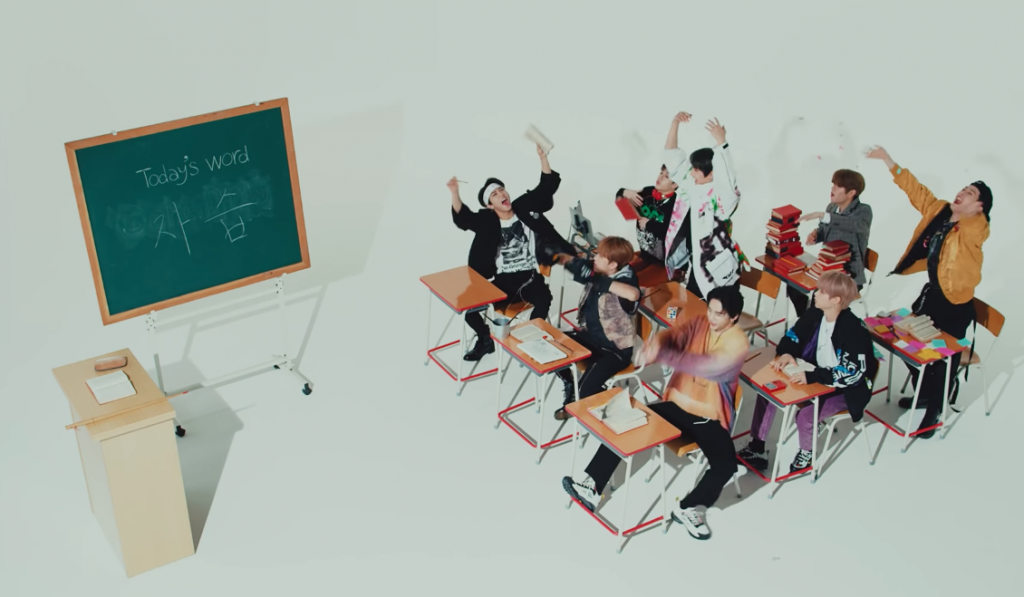
In pure 2019 fashion, the phrase “OK boomer” gained popularity because of TikTok. Although it can be first traced back to 2015, the phrase reached its interest meme status because of the exponential use of the song “Ok Boomer!” by Peter Kuli & Jedwill on TikTok.
The response of “OK boomer” demonstrates the growing gap between the younger generations, especially those of Generation Z (born between 1996 and 2015), and those of the baby boomer generation (born 1946-1965). This phrase dismisses the older generations when they force their opinions and views on the younger generations.
The younger generations are tired of explaining or defending how they live compared to those of the boomer generation, thus reducing their potentially long-winded thoughts and arguments with the simple—yet charged—two words: OK boomer. Frustration is expressed in this phrase, and it also notes the chasm between the worlds these generations know. There exists a struggle of understanding and communicating.
Stray Kids, now an eight-member group (as Woojin recently departed due to personal reasons) addresses this frustration and tiredness in their new song, “Mixtape: Gone Days.” The release of this digital single, a Mixtape Project, and its subsequent music video on December 26 succeeds the conclusion of the group’s Clé series with Clé : LEVANTER. Stray Kids’ leader and one of the three members of rapper subunit 3RACHA, Bang Chan, wrote the lyrics and composed the single.

“Gone Days,” meanwhile, sees Stray Kids frustrated. The title plays on the similar sound of “gone days” and 꼰대 (kkondae), which means old, nosy, bossy people. The members reflect annoyance of the younger generation in the chorus as they sing, “This is the new generation, go away.” They know that life has changed dramatically since the era of youth of the boomer generation, and they honestly just want to be left alone.
The staccato beat coupled with the sharp and quick notes sung almost mimics a response someone of a younger generation might be inclined to given when constantly hearing “back in my day” lectures and criticisms from the boomer generation. The members address this older generation who dwell in their memories and force their pasts onto the younger ones, as Felix notes in his lines, “just because you’re stuck in the past / Don’t drag me in.” Han continues the open, unfiltered expression in his rap where he challenges the belief that one’s seniors know best: “You think you’re right / Nobody’s right only opinion.”

The music video of “Gone Days” furthers the emotion behind Stray Kids’ lyrics. The opening scene is a simple set up: the eight members sit behind school desks, their full attention on the front of the room at their teacher. Their teacher has the head of a horse but a human body and also wears JYP credentials. To their left is a chalkboard with “Today’s Word: Gone Days” written on it. The teacher is presented as the default authority figure which Stray Kids, as students, dutifully follow. In the beginning, the members, as if in a trance, turn the pages of their books in unison at the command of their teacher.
In later shots, the eight of Stray Kids start breaking away from the uniformity expected of them. Instead of the same open book on all of their desks, the following scenes demonstrate various interests, ones that those of the older generations often criticize. Bang Chan is surrounded by at least three screens, while Felix bypasses the Rubik’s Cube on his desk for a handheld game. I.N. focuses his attention on the Stray Kids’ photocards, his washi tape, and the array of markers in front of him.

As the song progresses, the music video reflects this acknowledgement of differences in lifestyles between the older and younger generations. In the beginning of “Gone Days,” Stray Kids briefly follows the mold of behavior expected of them. The members contrast this with ignoring what their teacher (the older generation) tries to tell them to and what they tell them what to be. As Seungmin sings, Stray Kids sees this forcing of the past onto the younger generation as nagging. Around halfway through the music video, the members take their own paths, deciding to break away from the rigid authority. Instead of following along with what their teacher is pointing at on the chalkboard, the eight stand up on their desks and dance without a care in the world.
Changbin’s rap, however, notes a shift in how Stray Kids approach this point of tension. In his verse, he makes “Gone Days” more personal by directly addressing those of the older generations:
In some ways, I feel sorry for you I’ll tell you why
You want to teach me as a senior in life
You want me to be successful after 10 or 20 years
Thank you for caring about me.”
They try to understand the perspectives their seniors are coming from. They know that worries over stability and are at the root of what they see as nagging. The members acknowledge that generally this older generation cares for their well being, but the things the boomer generation want the younger ones to adapt are not necessarily relevant to the direction of life this generation wants to go in.
Yet, Stray Kids still wants to let the older generation that they are fed up with them impressing their opinions onto their lives. Minho shows a controlled frustration in his lines in the bridge. “Stop saying ‘back in my days’ / I can’t stand it anymore ey” as the main beat drops out, this absence further highlighting his words. Felix continues the bridge and the sentiment expressed in Changbin’s rap: “I get it you’re doing this because you’re worried / But trust me for once ey / I’ll take responsibility for the future.”
Stray Kids acknowledges that their lives are clearly not the same as life once was for the boomers. They want to have that autonomy over how they live it without being bombarded by other people’s opinions who do not always realize what it is like to grow up in the current day and age. The younger generations want their seniors to trust them. Bang Chan then closes the bridge with an assertive shout of “Let me be myself.“

An acceptance — or something that better resembles resignation— is reached by the end of the music video. One of the last scenes of “Gone Days” shows the teacher writing on the board “자습” (jaseub) which means “self study” where the students learn by themselves. As the teacher walks out of the frame, the members of Stray Kids cheer when they realize what has been written on the board.
The very last scene mimics that of the first. Bang Chan pats the arm of the teacher in a comforting manner while nodding his head in a gesture of understanding, in a way, noting that this difference is just the way it is. A similar set up is seen at the very beginning of the music video, as the teacher holds the same cup of coffee, food in their hand with an open book on the podium, and a JYP lanyard around their neck. However, in contrast to the ending, Bang Chan goes up to the teacher, stares at them, and then takes a bite of their food before leaving. By the end of “Gone Days,” a degree of acceptance of both perspectives has been reached, although a complete understanding may never be reached because of the drastic difference between the ages these generations at odds have grown up in.
Following “Gone Days,” the group unveiled Step Out of Clé on January 24, comprised of the English versions of previous releases “Double Knot” and “Levanter.” Stray Kids has created a new path for their sound particularly in light of their world tour. The eight members embarked on District 9: Unlock this week, kicking off on Wednesday, January 29 in New York City with a show at the Hulu Theater at Madison Square Garden.
A similar message from “Gone Days” prevails in the recent release of the English version of “Double Knot.” While the song was promoted as a single back in early October, the original consisted of lyrics majority in Korean which has been the case for Stray Kids’ music up until Step Out of Clé. Although fans are well known to have memorized Korean lyrics for tours, the choice to release “Double Knot” in English comes at a calculated time with the District 9: Unlock world tour starting in the United States.
The English lyrics of “Double Knot” vary slightly to the translations of the original, but the song maintains a similar Ok boomer tone that is seen in “Gone Days.” However, “Double Knot” possesses a more aggressive sound and less nail-on-the-head lyrics. With “Double Knot,” Stray Kids is unrestrained both in what they say and how they say it.

The members are prepared for the challenges ahead, and they relish in the fact that it is their choice to make their own paths, as Minho sings, “My decision, my life go go.” Felix and Han, in their rap verses, continue this sentiment with the lines, “blank sided dice / no sided coin” and “I do whatever I want,” respectively. In addition, throughout the pre chorus, Stray Kids emphasize the repetition of “free” in their lyrics.
Although “Double Knot” is not necessarily aimed at a specific audience like “Gone Days,” this song could still be speaking to that generation. The aggressive sound and lyrics that characterize “Double Knot” could be the things about owning their lives that they want to say out loud but rather keep as explosive thoughts.
TL;DR? Stray Kids said “OK boomer.”
This guest piece was written by Sara Conway. Sara is a writer, dreamer, and avid K-pop lover. When she isn’t writing articles, blogging about books, or listening to music, you can find her reading or struggling with her university work.
(YouTube, Vox, Color Coded Lyrics. Images via JYPE.)


